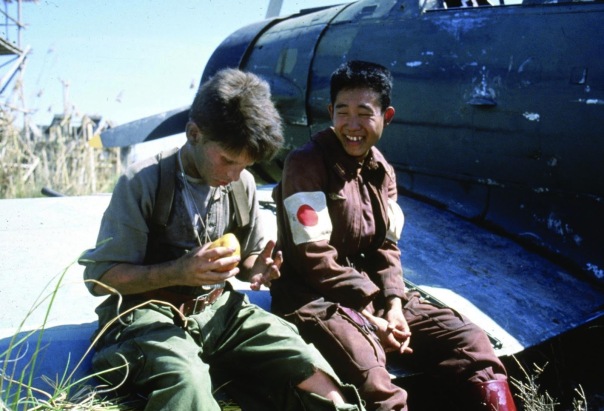
EMPIRE OF THE SUN, as in ‘The Rising Sun’, reflecting Japan’s imperial reign of ruin, 1931-1945. Specifically, Steven Spielberg’s 1987 epic focuses on the experience of an English boy captured in Shanghai, separated from his parents, scrambling to survive four years in captivity. Tom Stoppard’s screenplay came from J.G. Ballard’s semi-autobiographical 1984 novel (he spent ages 11 to 15 in Japanese POW camps in China). Spielberg: “It’s about the death of childhood. The story is probably quintessentially more about the death of childhood than anything I’ve made before or since.” Whether the film succeeds in that regard is open to discussion, but undeniably it’s an impressive production achievement, with a striking feature debut from 12-year-old Christian Bale.

World War 2. The day after Pearl Harbor, Japanese forces take Shanghai and the panic-stricken foreigners living in the International Settlement attempt to flee. Many are imprisoned, including British schoolboy ‘Jamie Graham’, separated from his parents in the mob. Over the course of four years in captivity Jim learns survival skills. He does this under tutelage from cynical American ex-pat ‘Basie’ (John Malcovich), and views the brutal kaleidoscope of camp life as an adventure, even befriending a young enemy pilot-in-training. His once-pampered childhood evaporates into a world of scavenging, sickness, cruelty and mixed-up loyalties.

Bale is a whirlwind of energy and intelligence as the hero, although it’s hard to warm up to the character. It’s hard to warm up to any of the characters in the 153 minutes of this relentlessly dreary tale. You watch scenes unfold and recognize you’re supposed to feel empathy, but with hardly anyone to root for, you’re left impressed by the detailed production design and some of Spielberg’s rip-it-up action staging, but you cool to the human element. It doesn’t help when John Williams’ score overloads Big Emotional Moments with feel-this bombast.

Location filming in Shanghai, Spain and the U.K. employed thousands of extras, and the vast array of sets and equipment, costumes and props is quite impressive. The first section of the film is the best, highlighting the chaos of the capture of the city. The later syrupy jive with the kamikaze pilot is ham-fisted sentiment that curdles.
Dutifully Oscar-nominated for Cinematography, Film Editing, Music Score, Art Direction, Costume Design and Sound, losing out in each category to the year’s other big historical epic set in China, The Last Emperor. A domestic gross of $22,238,696 saw it place a weak 52nd for the year, blanching under a cost factor of around $35,000,000, though ultimately worldwide revenue took it up to $66,700,000.

Also in the cast: Nigel Havers, Miranda Richardson, Joe Pantoliano, Leslie Phillips, Masat Ibu, Emily Richard, Rupert Frazer, Takatarô Kataoka, Ben Stiller, Robert Stephens and Burt Kwouk. “Suo Gan”, the movies piercing theme song, is a Welsh lullaby.
A much better picture dealing with a child’s impressions of war came out that same year: John Boorman’s excellent Hope And Glory.

Tell me another one…